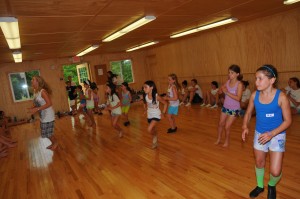
Today’s world has become inundated with technology. Whether it be checking the amount of likes you received on your latest Instagram, scrolling through Facebook, or trying to take the perfect selfie, our focus on technology has overpowered our daily lives. Without the ability to live in the moment and appreciate our surroundings, technology continues to have the upperhand on blocking face to face communication between individuals. This is why getting the chance to unplug for seven weeks at camp is the perfect opportunity to take a step back from the outside pressures of life and enjoy the people that surround you.
For seven of the fifty-two weeks of the year, you can explore everything the world around you has to offer. Once reveille blows in the morning, your day starts by enjoying the view of the morning mist coming off the lake and the sounds of birds chirping. Meals are filled with lively conversations with your bunkmates, spirited cheers, and songs. As the day progresses, opportunities to grow your creativity and skills continue. From learning how to dive at the lake to conquering your fear of climbing the rock wall to then fly down the zipline, unplugging allows us to experience new adventures each day of the summer.
It may sound far-fetched, but the friendships I have established at camp have surpassed all other relationships I have ever made. Camp friends see the real you, not the version of yourself that you post for the world to see on social media. Without the barrier of a screen between individuals, concrete bonds can form and lifelong memories are made. Interactions at camp are both real and authentic. I still talk to my bunkmates from my first summer in 2006, and when I see them, it is as if we have never been apart.
The unplugged atmosphere at camp allows you to be yourself at all hours of the day. Whether it be coming up with a dance for MTV night, going to different activities with your bunk, or dressing up for a wacky event, your spirit and confidence shines. Everywhere you look, people are smiling, cheering, singing, and dancing. At camp, you can be yourself and achieve all your expectations, with the acceptance and support of everyone around you.
The act of unplugging is so much more than being without technology for seven weeks. It’s a chance to explore, create, and experience new adventures. Unplugging has allowed friendships to be established and lifelong memories to be made. Most importantly, unplugging at camp allows us all to embrace our individuality and learn to be our true selves.








